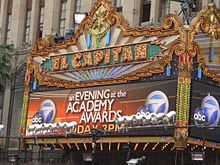El Capitan Theater
|
|

El Capitan Theatre, 2009
|
|
|
Location within Los Angeles County
|
|
| Address | 6838 Hollywood Boulevard Hollywood, Los Angeles, California United States |
|---|---|
| Coordinates | 34°06′04″N 118°20′23″W / 34.101111°N 118.339722°W |
| Operator | Buena Vista Theatres, Inc. |
| Type | Movie palace |
| Capacity | 1,100 |
| Screens | 1 |
| Construction | |
| Opened | 3 May 1926 |
| Closed | 1941 1989 |
| Reopened | 1942 1991 |
| Architect | G. Albert Lansburgh Stiles O. Clements |
| Builder | Charles E. Toberman |
| Tenants | |
| Walt Disney Studios Motion Pictures | |
| Website | |
| elcapitantheatre |
|
| Designated | 1990 |
| Reference no. | 495 |
El Capitan Theatre is a fully restored movie palace at 6838 Hollywood Boulevard in Hollywood. The theater and adjacent Hollywood Masonic Temple (now known as the El Capitan Entertainment Centre) is operated by Buena Vista Theatres, Inc., a subsidiary of Walt Disney Studios Motion Pictures Distribution, and as such, serves as the venue for a majority of the The Walt Disney Studios' film premieres.
In the early 1920s, real estate developer Charles E. Toberman (the "Father of Hollywood") envisioned a thriving Hollywood theatre district. Toberman was involved in 36 projects while building the Max Factor Building (now the Hollywood Museum), Hollywood Roosevelt Hotel and the Hollywood Masonic Temple. With Sid Grauman, he opened the three themed theatres: Egyptian (1922), El Capitan ("The Captain") (1926), and Chinese (1927).
El Capitan, dubbed "Hollywood's First Home of Spoken Drama," opened as a legitimate theatre on May 3, 1926 with Charlot's Revue starring Gertrude Lawrence and Jack Buchanan. Barker Bros. Furniture Emporium took up the rest of the building in the 1920s.
For a decade it presented live plays, with over 120 productions including such legends as Clark Gable and Joan Fontaine. By the late 1930s, El Capitan felt the economic effects of the Depression, showcasing fewer and fewer productions. This period saw a cycle of experimentation with entertainment. In an effort to boost attendance at the theatre, its management attempted to lure revues, road shows and benefits. Despite these efforts, business was faltering. The theatre then began showing movies. When Orson Welles was unable to locate a theatre owner willing to risk screening Citizen Kane, he turned to El Capitan, and in 1941, Citizen Kane had its world premiere there. The theater then closed for one year as Paramount Pictures purchased the theater.
...
Wikipedia

